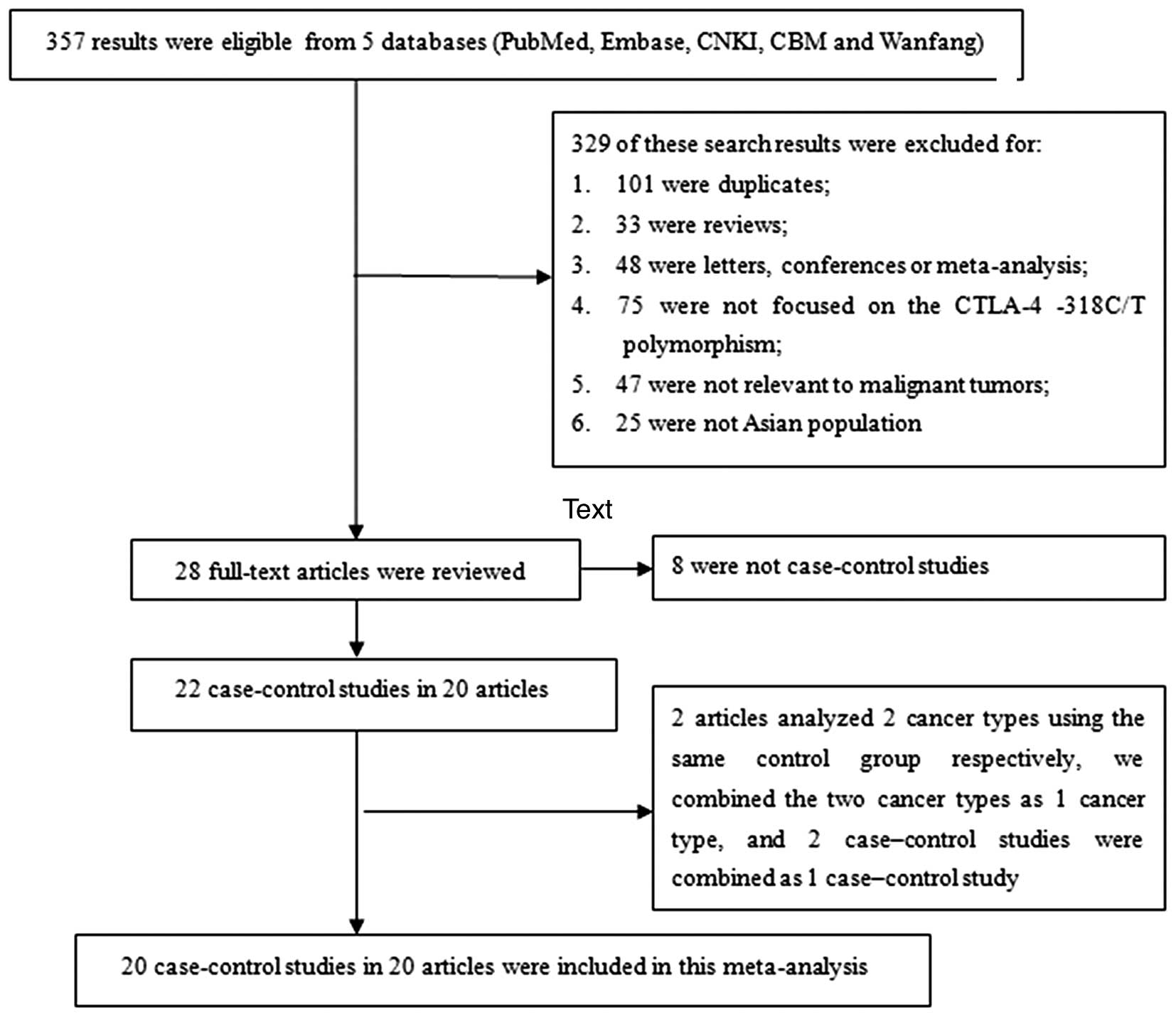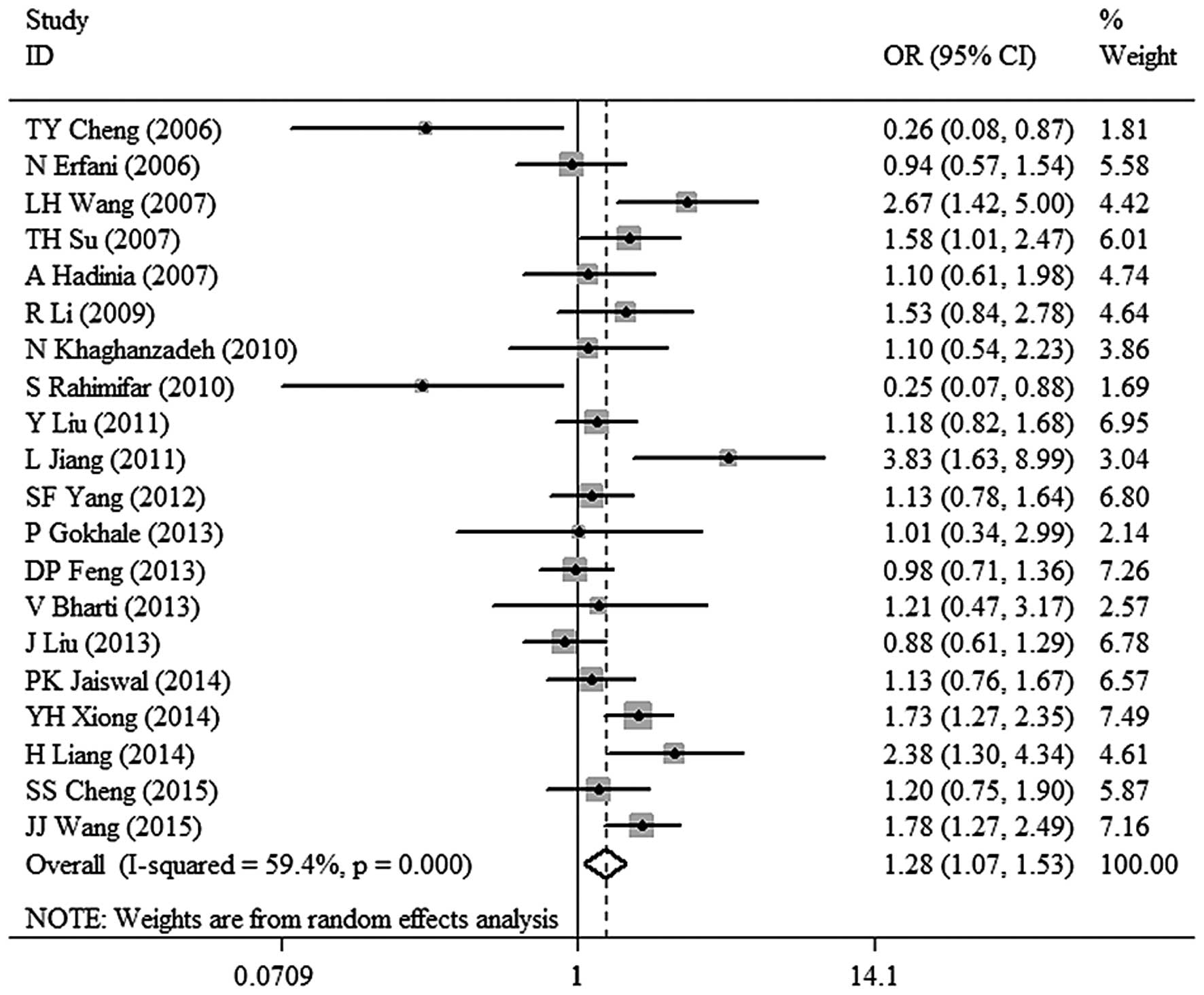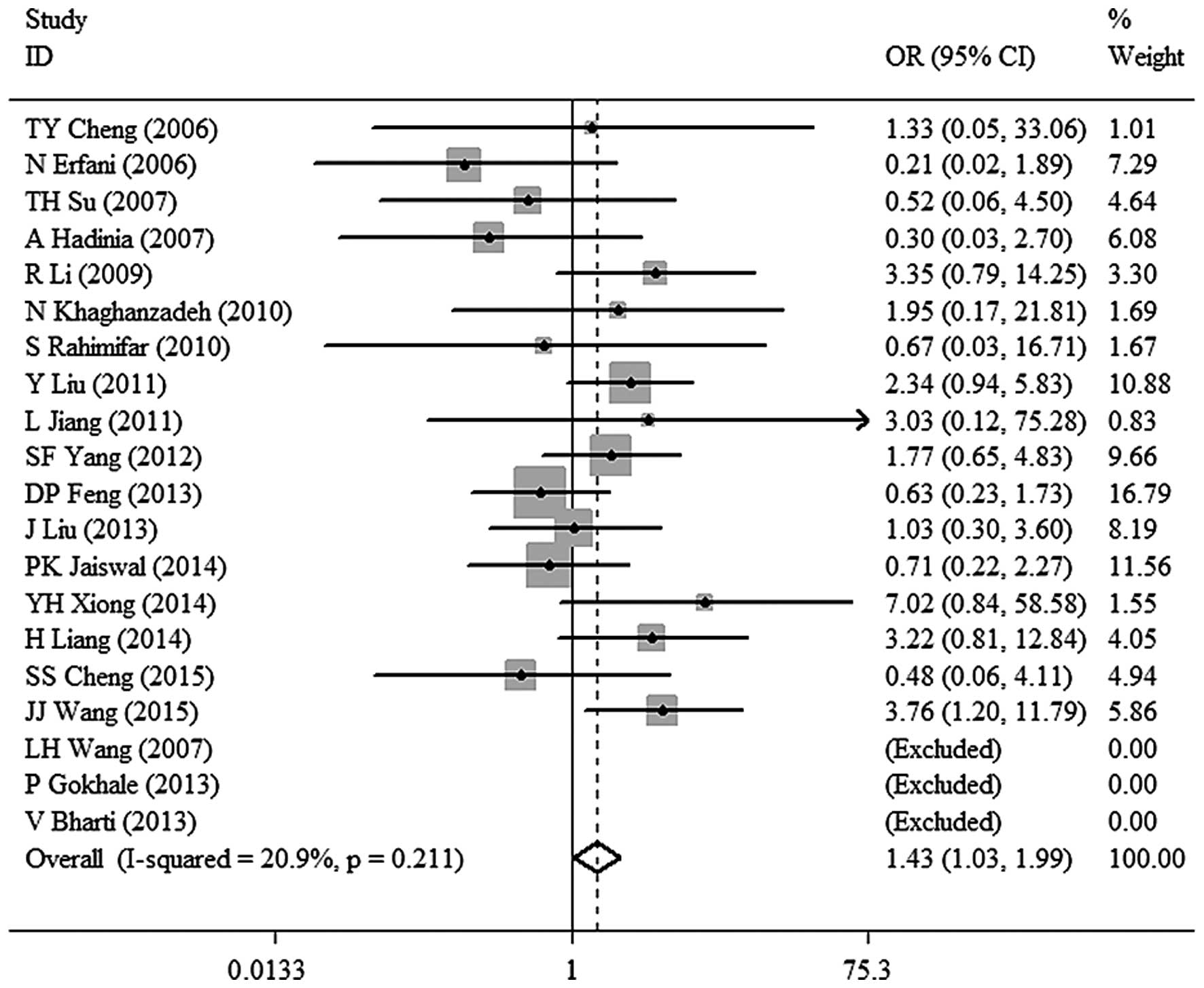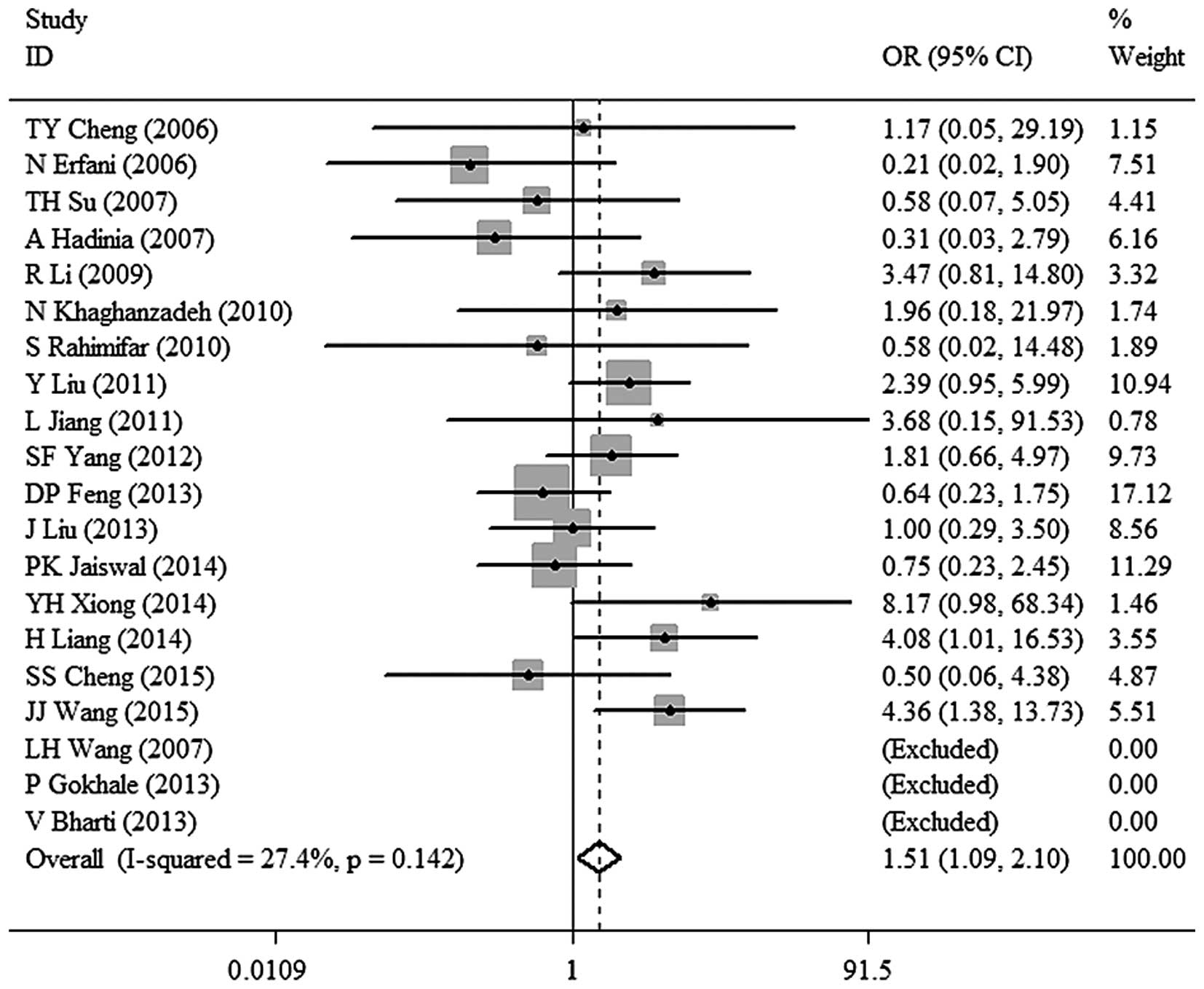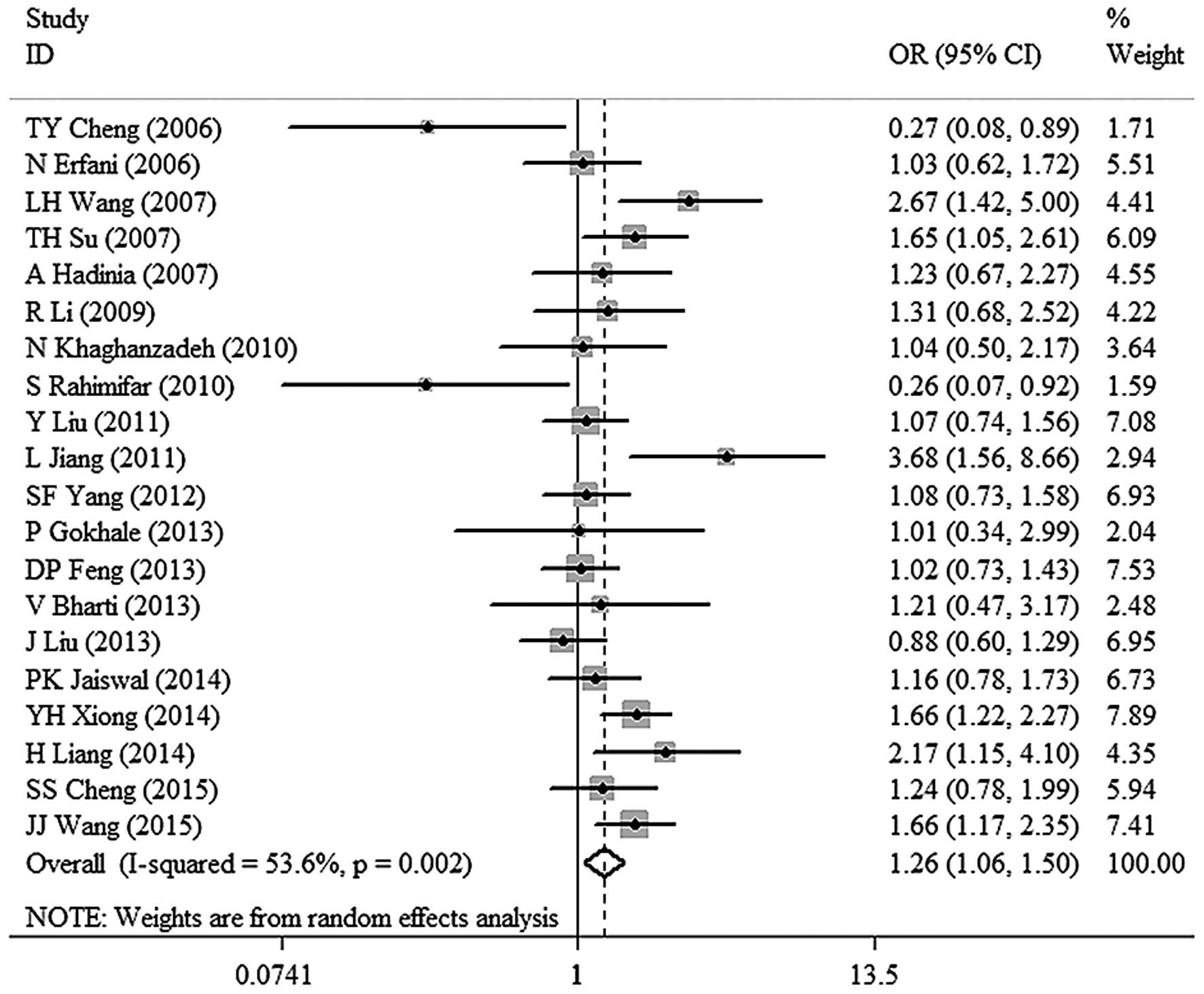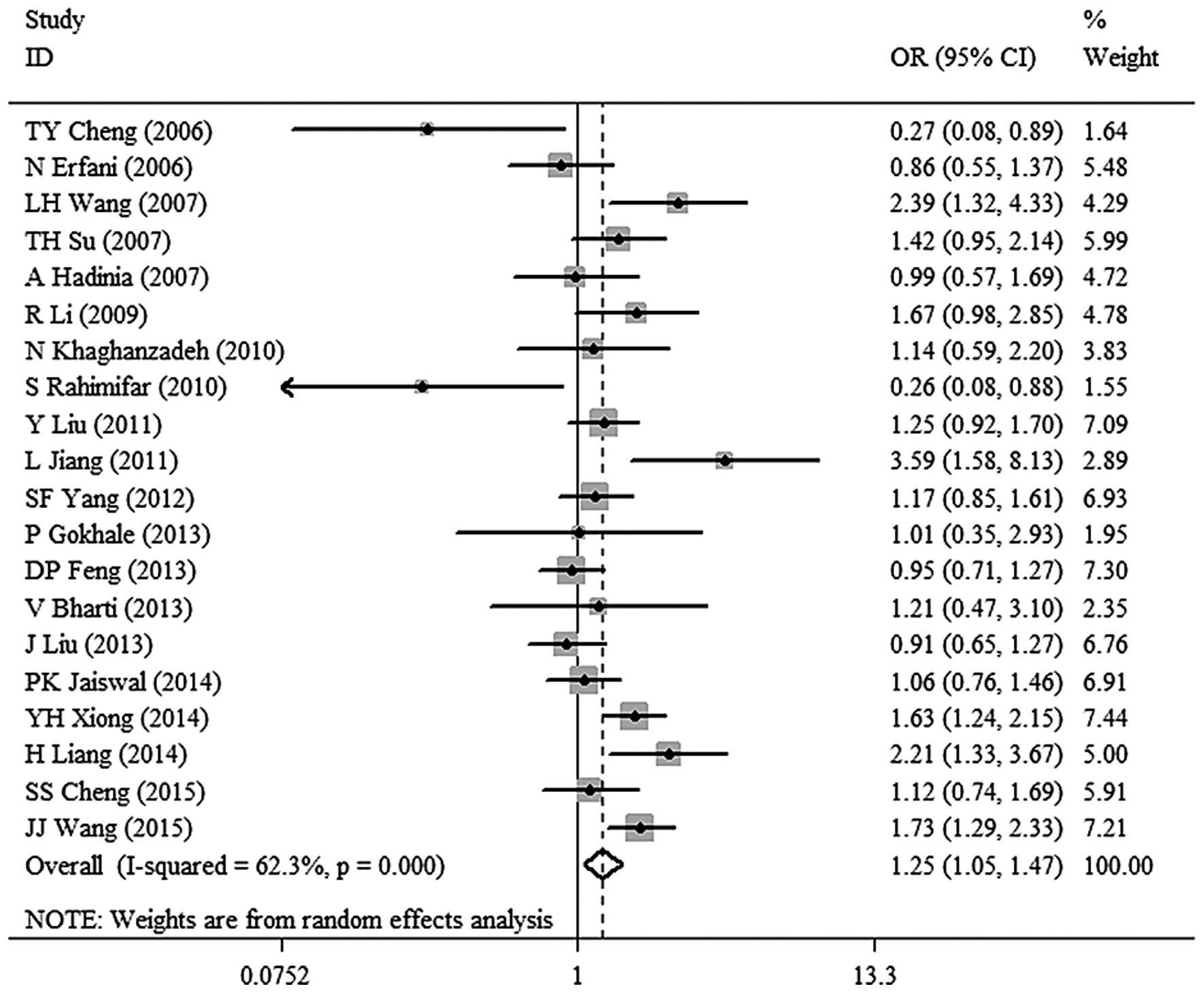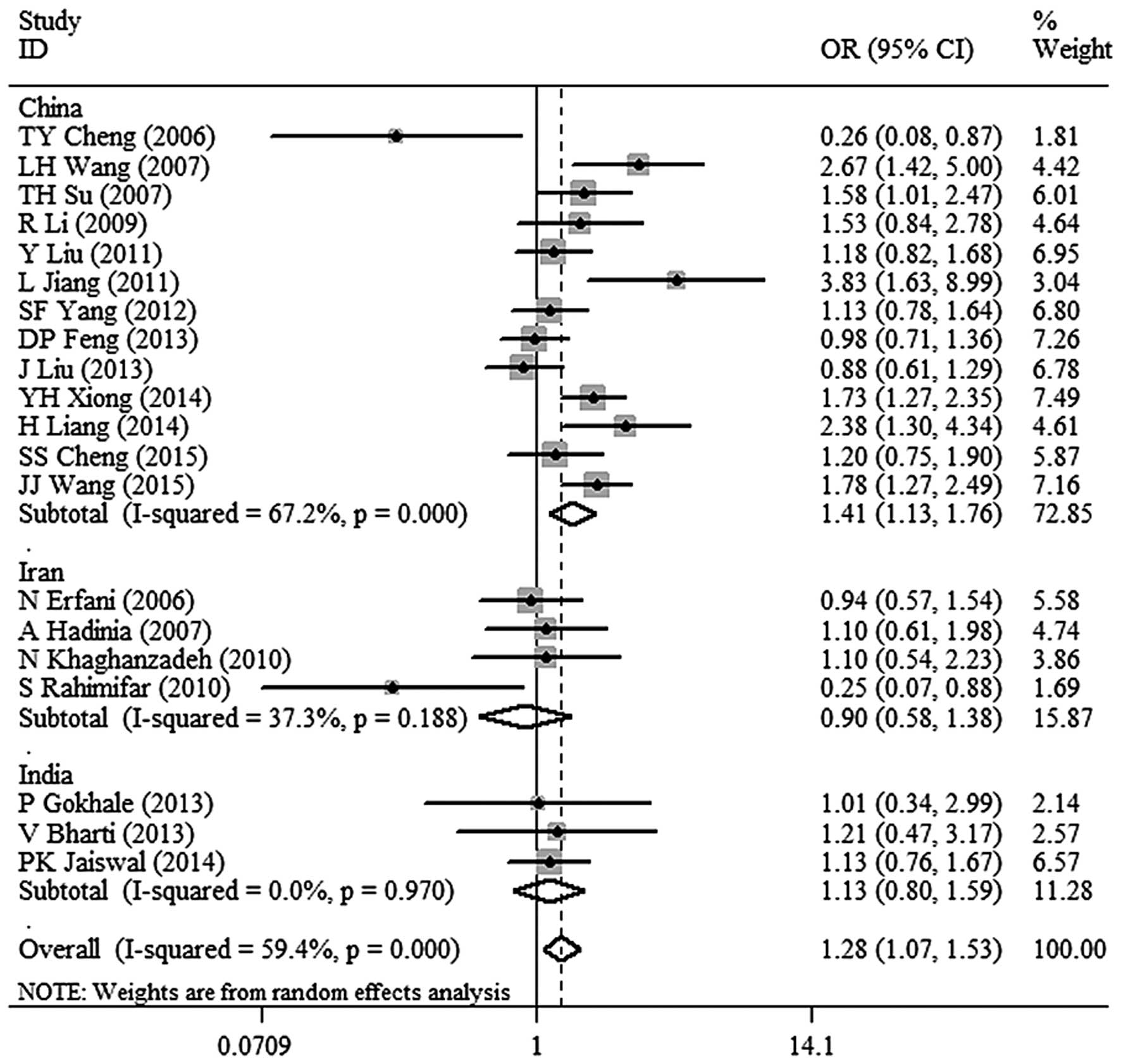|
1
|
Bredberg A: Cancer: More of polygenic
disease and less of multiple mutations? A quantitative viewpoint.
Cancer. 117:440–445. 2011. View Article : Google Scholar : PubMed/NCBI
|
|
2
|
Wong YK, Chang KW, Cheng CY and Liu CJ:
Association of CTLA-4 gene polymorphism with oral squamous cell
carcinoma. J Oral Pathol Med. 35:51–54. 2006. View Article : Google Scholar : PubMed/NCBI
|
|
3
|
Ramakrishnan R and Gabrilovich DI: Novel
mechanism of synergistic effects of conventional chemotherapy and
immune therapy of cancer. Cancer Immunol Immunother. 62:405–410.
2013. View Article : Google Scholar : PubMed/NCBI
|
|
4
|
Zhang Y, Zhang J, Deng Y, Tian C, Li X,
Huang J and Fan H: Polymorphisms in the cytotoxic T-lymphocyte
antigen 4 gene and cancer risk: A meta-analysis. Cancer.
117:4312–4324. 2011. View Article : Google Scholar : PubMed/NCBI
|
|
5
|
Ghaderi A: CTLA4 gene variants in
autoimmunity and cancer: A comparative review. Iran J Immunol.
8:127–149. 2011.PubMed/NCBI
|
|
6
|
Sun T, Zhou Y, Yang M, Hu Z, Tan W, Han X,
Shi Y, Yao J, Guo Y, Yu D, et al: Functional genetic variations in
cytotoxic T-lymphocyte antigen 4 and susceptibility to multiple
types of cancer. Cancer Res. 68:7025–7034. 2008. View Article : Google Scholar : PubMed/NCBI
|
|
7
|
Cheng TY, Lin JT, Chen LT, Shun CT, Wang
HP, Lin MT, Wang TE, Cheng AL and Wu MS: Association of T-cell
regulatory gene polymorphisms with susceptibility to gastric
mucosa-associated lymphoid tissue lymphoma. J Clin Oncol.
24:3483–3489. 2006. View Article : Google Scholar : PubMed/NCBI
|
|
8
|
Erfani N, Razmkhah M, Talei AR, Pezeshki
AM, Doroudchi M, Monabati A and Ghaderi A: Cytotoxic T lymphocyte
antigen-4 promoter variants in breast cancer. Cancer Genet
Cytogenet. 165:114–120. 2006. View Article : Google Scholar : PubMed/NCBI
|
|
9
|
Wang L and Li D, Fu Z, Li H, Jiang W and
Li D: Association of CTLA-4 gene polymorphisms with sporadic breast
cancer in Chinese Han population. BMC Cancer. 7:1732007. View Article : Google Scholar : PubMed/NCBI
|
|
10
|
Su TH, Chang TY, Lee YJ, Chen CK, Liu HF,
Chu CC, Lin M, Wang PT, Huang WC, Chen TC, et al: CTLA-4 gene and
susceptibility to human papillomavirus-16-associated cervical
squamous cell carcinoma in Taiwanese women. Carcinogenesis.
28:1237–1240. 2007. View Article : Google Scholar : PubMed/NCBI
|
|
11
|
Hadinia A, Hossieni SV, Erfani N,
Saberi-Firozi M, Fattahi MJ and Ghaderi A: CTLA-4 gene promoter and
exon 1 polymorphisms in Iranian patients with gastric and
colorectal cancers. J Gastroenterol Hepatol. 22:2283–2287. 2007.
View Article : Google Scholar : PubMed/NCBI
|
|
12
|
Li R, Xia B, Xiao H, Jiang Y and Zhou F:
Association between CTLA-4 gene promoter region polymorphisms at
positions −1661 and −318 and gastric cancer. Clin J Gastroenterol.
14:332–336. 2009.
|
|
13
|
Khaghanzadeh N, Erfani N, Ghayumi MA and
Ghaderi A: CTLA4 gene variations and haplotypes in patients with
lung cancer. Cancer Genet Cytogenet. 196:171–174. 2010. View Article : Google Scholar : PubMed/NCBI
|
|
14
|
Rahimifar S, Erfani N, Sarraf Z and
Ghaderi A: ctla-4 gene variations may influence cervical cancer
susceptibility. Gynecol Oncol. 119:136–139. 2010. View Article : Google Scholar : PubMed/NCBI
|
|
15
|
Liu Y, He Z, Feng D, Shi G, Gao R, Wu X,
Song W and Yuan W: Cytotoxic T-lymphocyte antigen-4 polymorphisms
and susceptibility to osteosarcoma. DNA Cell Biol. 30:1051–1055.
2011. View Article : Google Scholar : PubMed/NCBI
|
|
16
|
Jiang L, Luo RY, Zhang W, Wang LR, Wang F
and Cheng YX: Single nucleotide polymorphisms of CTLA4 gene and
their association with human cervical cancer. Zhonghua Yi Xue Yi
Chuan Xue Za Zhi. 28:313–317. 2011.(In Chinese). PubMed/NCBI
|
|
17
|
Yang S, Wang C, Zhou Y, Sun G, Zhu D and
Gao S: Cytotoxic T-lymphocyte antigen-4 polymorphisms and
susceptibility to Ewing's sarcoma. Genet Test Mol Biomarkers.
16:1236–1240. 2012. View Article : Google Scholar : PubMed/NCBI
|
|
18
|
Gokhale P, Kerkar S, Tongaonkar H, Salvi V
and Mania-Pramanik J: CTLA-4 gene polymorphism at position +49
A>G in exon 1: A risk factor for cervical cancer in Indian
women. Cancer Genet. 206:154–161. 2013. View Article : Google Scholar : PubMed/NCBI
|
|
19
|
Feng D, Yang X, Li S, Liu T, Wu Z, Song Y,
Wang J, Gao W, Huang Q, Huang W, et al: Cytotoxic T-lymphocyte
antigen-4 genetic variants and risk of Ewing's sarcoma. Genet Test
Mol Biomarkers. 17:458–463. 2013. View Article : Google Scholar : PubMed/NCBI
|
|
20
|
Bharti V, Mohanti BK and Das SN:
Functional genetic variants of CTLA-4 and risk of tobacco-related
oral carcinoma in high-risk North Indian population. Hum Immunol.
74:348–352. 2013. View Article : Google Scholar : PubMed/NCBI
|
|
21
|
Liu J, Liu J, Song B, Wang T, Liu Y, Hao J
and Yu J: Genetic variations in CTLA-4, TNF-α, and LTA and
susceptibility to T-cell lymphoma in a Chinese population. Cancer
Epidemiol. 37:930–934. 2013. View Article : Google Scholar : PubMed/NCBI
|
|
22
|
Jaiswal PK, Singh V and Mittal RD:
Cytotoxic T lymphocyte antigen 4 (CTLA4) gene polymorphism with
bladder cancer risk in North Indian population. Mol Biol Rep.
41:799–807. 2014. View Article : Google Scholar : PubMed/NCBI
|
|
23
|
Xiong YH, He L and Fei J: Genetic
variations in cytotoxic T-lymphocyte antigen-4 and susceptibility
to cervical cancer. Int Immunopharmacol. 18:71–76. 2014. View Article : Google Scholar : PubMed/NCBI
|
|
24
|
Hui L, Lei Z, Peng Z, Ruobing S and
Fenghua Z: Polymorphism analysis of CTLA-4 in childhood acute
lymphoblastic leukemia. Pak J Pharm Sci. 27(Suppl 4): 1005–1013.
2014.PubMed/NCBI
|
|
25
|
Cheng S, Li J, Liu W, Liu C, Su L, Liu X,
Guo L, Ma Y, Song B and Liu J: LTA + 252A > G polymorphism is
associated with risk of nasal NK/T-cell lymphoma in a Chinese
population: A case-control study. BMC Cancer. 15:4802015.
View Article : Google Scholar : PubMed/NCBI
|
|
26
|
Wang JJ, Wang ZB and Huang WF: The
correlation of cytotoxic T lymphocyte antigen 4 polymorphisms with
occurrence of cervical cancer. Pract J Clin Med. 12:77–80.
2015.
|
|
27
|
Jackson D, White IR and Riley RD:
Quantifying the impact of between-study heterogeneity in
multivariate meta-analyses. Stat Med. 31:3805–3820. 2012.
View Article : Google Scholar : PubMed/NCBI
|
|
28
|
Leach DR, Krummel MF and Allison JP:
Enhancement of antitumor immunity by CTLA-4 blockade. Science.
271:1734–1736. 1996. View Article : Google Scholar : PubMed/NCBI
|
|
29
|
Xu HB, Yang H, Liu T and Chen H:
Association of CTLA4 gene polymorphism (rs5742909) with cervical
cancer: A meta-analysis. Tumour Biol. 35:1605–1608. 2014.
View Article : Google Scholar : PubMed/NCBI
|















